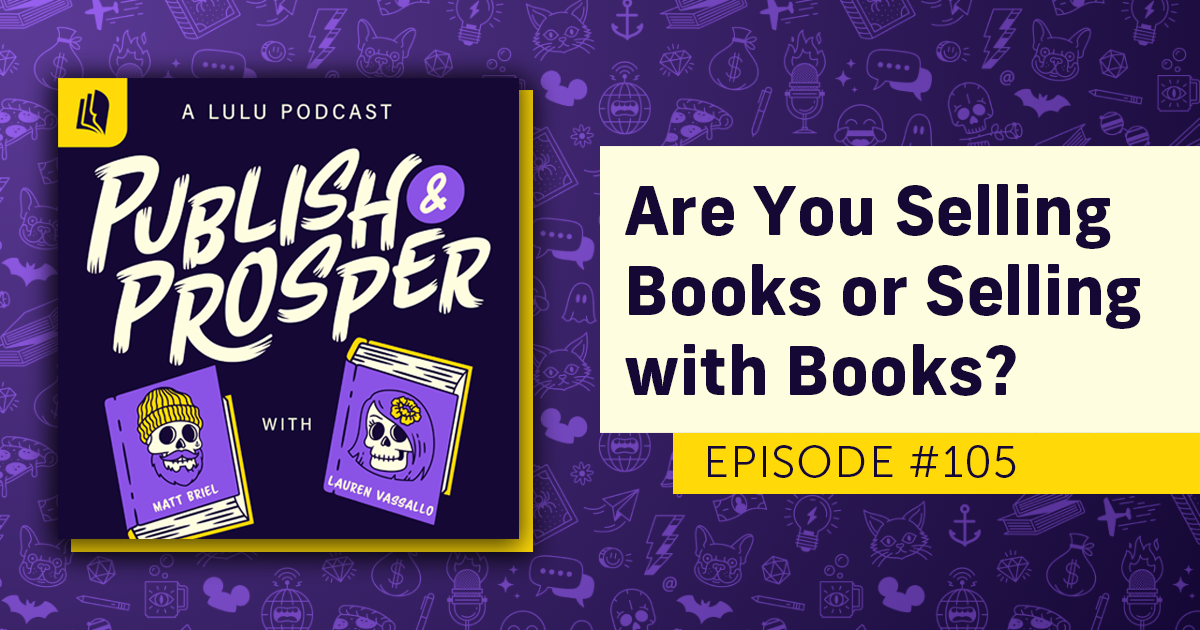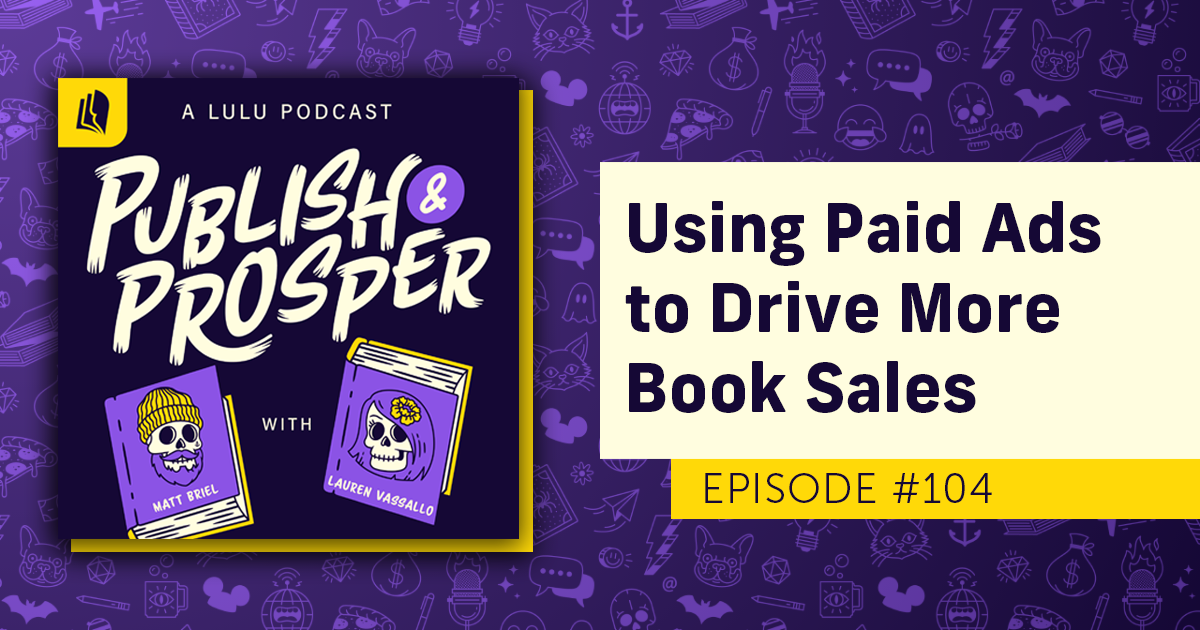What Is Content Marketing for Authors and Creators?
For authors and creators, content marketing has always been a standard practice for promoting your work and your brand. As our communications tools evolved, content marketing has become pervasive: you can find examples of companies small and large leveraging content to inspire their customers and capture the interest of searchers.
Whether you’re a new creator preparing to launch your first product or a seasoned veteran with a backlist of books and products, content marketing is one of the best ways to build your authority, rank on search engines, and grow your profits.
What Is Content Marketing?
Content Marketing is a method of marketing that uses content (like videos, podcasts, blog posts, and social media posts) to inform and educate without explicitly promoting brand awareness or selling your product. Here’s an even more eloquent definition from the Content Marketing Institute:
Content marketing is a strategic marketing approach focused on creating and distributing valuable, relevant, and consistent content to attract and retain a clearly defined audience — and, ultimately, to drive profitable customer action.
- Content Marketing Institute
Essentially, as a content marketer, you will:
- Create valuable content in a niche or field you have an expansive knowledge of;
- Tailor that content to address buyer personas (we’ll touch on those later) for your target audience;
- Include your own products and services as a solution (but not the ONLY solution).
If you’re wondering how to focus your content marketing efforts, the best way is to break it down into four parts:
- Content strategy and your editorial calendar
- Defining potential customers and developing reader/buyer personas
- Focus on specific platforms/media that appeal to your audience
- Create great content that addresses pain points for your audience
There are many types of content marketing, but as an entrepreneur and creator, you can focus on content types that offer valuable information. A successful content marketing strategy will look different for everyone; you will need to decide how best to focus your marketing efforts based on your audience, your content and expertise, and the goals you establish for yourself.
What Are the Benefits of Content Marketing?
If content marketing strategies have one flaw, it’s the challenge of attributing value to your efforts. If you spend $500 on Google Ads and get $1,000 in sales from those ads, it’s easy to do the math to determine the value.
When marketers talk about content marketing, they mean blogs, videos, podcasts, and social media posts. This is content you create to:
- Explain something
- Teach something
- Build a relationship with your followers
All three points work to establish your personal brand and solidify you as a thought leader, but rarely do they directly lead to revenue. When you create and share valuable content, you’re fostering a community around you, your knowledge, and your products or services.
Someone reading a helpful blog post might not buy your book today, but if you create business goals that stretch long-term, you’ll start to see those casual readers turning into fans of your content, and eventually (some fans) will buy from you.
As an authorpreneur, you’re most likely a marketing team of one. That means you’ll be doing all the work yourself—including social media marketing, search engine optimization, creating landing pages, developing an email marketing plan, and the list goes on. With so many potential tasks, you need a strategy to ensure you’re following the best practices, creating the right content for your audience, and establishing yourself as a subject matter expert.

Developing Your Content Marketing Strategy
In the fiction writing world, there are generally two accepted kinds of writers: planners and pantsers. The idea is that some authors plan their story in-depth before writing and some write without much (if any) outlining (ie, “by the seat of their pants”). As a writer and creator, you CAN NOT be a pantser when it comes to your content strategy. Your best chance for success relies on planning effective ways to create relevant content and get that content in front of the right people, at the right time.
From the beginning, create a content marketing strategy that emphasizes quality and information. You’re aiming to generate traffic for your site from both your existing fans (when you share your content with them) and new fans (who will find the content while searching).
Your content marketing strategy needs to address four points:
- The niche and audience for your content
- How you’ll create that content and where it will live
- Distributing the content to your fans
- Ensuring the content can be found by searchers
As you plan your content marketing strategy, ask yourself “what problems am I solving?” If each piece of content can solve a problem or answer a question for your target audience and/or people searching, you’re well on your way to creating effective, helpful content.
Rather than reinvent the wheel, I’ll refer you to HubSpot’s guide to developing a content strategy. If you’re ready to develop an in-depth, long-term content strategy, this guide is the best place to start.

Planning Content Marketing Campaigns
As a content creator, you are already familiar with breaking large tasks down to make the work less daunting. Take the same approach to your marketing efforts.
Planning your strategy will encompass three broad steps:
- Researching your audience to learn the kinds of content they want
- Finding topics and associated keywords
- Creating content using the medium your audience prefers
#1 Audience Research
The first step in your content marketing campaign will be defining an audience. If you’ve already got followers on social media or a mailing list, you’ve got a head start. But even then, you should refine your audience to a segment of fans who will benefit from or enjoy your content.
As an author, you should already have a sense of your content and your audience. If you write serial fiction, you’ve got readers who are entertained and invested in your story. If you write training guides for UX design, you’re targeting designers who want to expand their skills.
Even if the content you’re creating might apply to all of your followers, you should define an audience. Knowing who you’re talking to will assist in making your content specific and will give you direction for the marketing around that content.

#2 Topics & Keywords
With search being so pervasive (we search about 40,000 times per second), it is well worth your time to help boost your content through search results. According to some measures, more than half of all website traffic comes from searches.
Taking the time to research and carefully use keywords and phrases related to your content’s topic will help searchers find your content and you’ll be positioning your work to be evergreen, retaining and continually growing the audience for that content.
Here’s my method for preparing a new piece of content using a keyword-focused approach.
First, take out a pen and paper (or open a fresh Doc) and write down 5-10 terms or phrases that you think of when you think about your topic. Then write out a question about the topic using each of those terms or phrases. Finally, take what you’ve created, open an Incognito Window, and search each term/phrase and question.
I like to make a spreadsheet and copy in the top three (non-Ad) links for each search. Now I can see what other companies and individuals are writing about (or making videos about) within the same topic I’m considering. It’s also wise to use Google Trends to see which keywords are popular.
This should give you a lot of material to consider. Think about how you can write about the topic without redoing the existing articles. Maybe you can even use some of these results as source material, just like I’ve done with HubSpot’s guide above.
Now you should look to use a free (or paid if you can budget it) SEO research tool to find additional terms and phrases related to the primary terms those articles you just read are using.
Free Keyword Research Tools:
- Moz Keyword Research – Moz’s keyword research tool offers 10 free searches per month. You’ll get their scores for your keyword, and related terms, and you’ll see which pages are currently ranking well for your keyword.
- AHREFs Keyword Generator – Use AHREF’s keyword generator to create a list of related keywords and see questions people ask related to your keyword.
- Answer The Public – Answer The Public lets you see a variety of questions related to your keyword, helping you determine what problems you can solve for your audience.
- SEO Surfer – SEO Surfer offers a Chrome extension that displays related keywords right on your Google search results page. This is very helpful when doing initial research and planning for your content’s topic.
As you create your content, weave in those terms/phrases and questions. It doesn’t take long to do some basic keyword research and enrich your post. Well-optimized content can appear at the top of search results pages, earning you more traffic and building your authority, which can lead to backlinks (another valuable way to earn traffic on your site)!

Your Free Lulu Account
Create a Lulu Account today to print and publish your book for readers all around the world
#3 Creating High-Quality Content
As a writer and creator, you should have a leg up on creating content. Just be aware that you’ll need to retrain yourself a bit to write for your audience and for the search algorithms that will help people find your content.
You’ll want to iterate a few headlines and look for something catchy, that differs from existing content, and features the most important keywords prominently. Think about where and how you’ll be sharing your content too. A detailed headline might be best for a blog post or video content, but a social post might want a humorous or light-hearted headline to pique your fans’ interest.
The goal of your content is to draw in readers. Joanna Penn, a well-known authority on publishing, calls content “the engine that can drive people to your website.” Getting that engine going means you’re optimized for search (so readers find you), the content is interesting (so they want to read), and proves your expertise (so they buy your book).
Content Creation Options
Most likely you’ll start with blogging (being a writer and all). But content marketing takes on any number of forms. Consider some of the following ways to create and offer content to your audience:
- White Papers – Not as common as they once were, a white paper is your opportunity to present a persuasive look at your own products, services, or even your creative process.
- Case Studies – Authoring a case study is another great way to offer useful and educational content that builds your authority and shows you are a subject matter expert.
- YouTube Channel – If you like making videos, developing a YouTube channel based on your skills or expertise is basically a must. Not only is video one of the most popular types of content right now, but you’ll also be able to repurpose your videos for other channels (such as sharing a shortened version on Instagram or embedding the video in a blog post).
- Landing Pages – A unique web page built with a specific purpose. Usually, landing pages aim to drive organic traffic or provide a page to gather a fan’s contact information for future marketing efforts.

Distributing Your Content
How you get your content into your readers’ hands (or onto their screens more often) is the hardest part of content marketing. And potentially most crushing. You are going to see some discouraging numbers. Best to steel yourself for that now.
No matter what kind of content you make, you’ll want to host it on your own website. That way everyone engaging with your content is only a click away from buying your book or joining your mailing list!
You should also be leveraging free tools like Google Analytics and Search Console to help track how many people visit your site, which pages they visit, and about one million other things. You don’t have to go too deep into understanding the data immediately. Primarily you’ll look for trends. Did views and sessions peak last Monday? Why?
That data will help inform which pieces of content are performing well (as in, people are reading/viewing the content) and how people are finding that content.
Finally, take the time to map out which platforms to use. If your audience is largely on Facebook and Instagram, you’re going to focus on content that is successful on those platforms. Be certain you’re creating the right kind of content for both the platform and your audience.

Create Your Book
Use Lulu's free templates to easily create and publish your book today.
Content Marketing Is a Marathon
Successful content marketing is built on consistency and momentum. Create a strategy and stick to it. If the strategy isn’t working, evaluate why and redesign. If it is working, look for opportunities to improve.
Content that can be found by search (like blogs or videos) needs to be optimized for search. If you’ve created content that your readers love, Google will start to notice people are clicking on and staying on your site. They’ll see you’ve created content people find valuable and will naturally start showing that content to more people.
You will have to balance distributing your content to your network and winning new readers/followers through online searches. If you’re focusing on your existing network, you’ll have a good sense of what resonates with them. But for broader appeal, you’ll want to optimize your content for search.
Regardless of the audience you’re targeting, I advocate for making your content search engine-friendly. Fortunately, you can optimize for SEO without a huge effort. By employing content marketing principles, you can grow your author brand (meaning people will know who you are) and build up sales. The process is slow, but if you stick with it, you should enjoy more and more sales with each new title you release!





